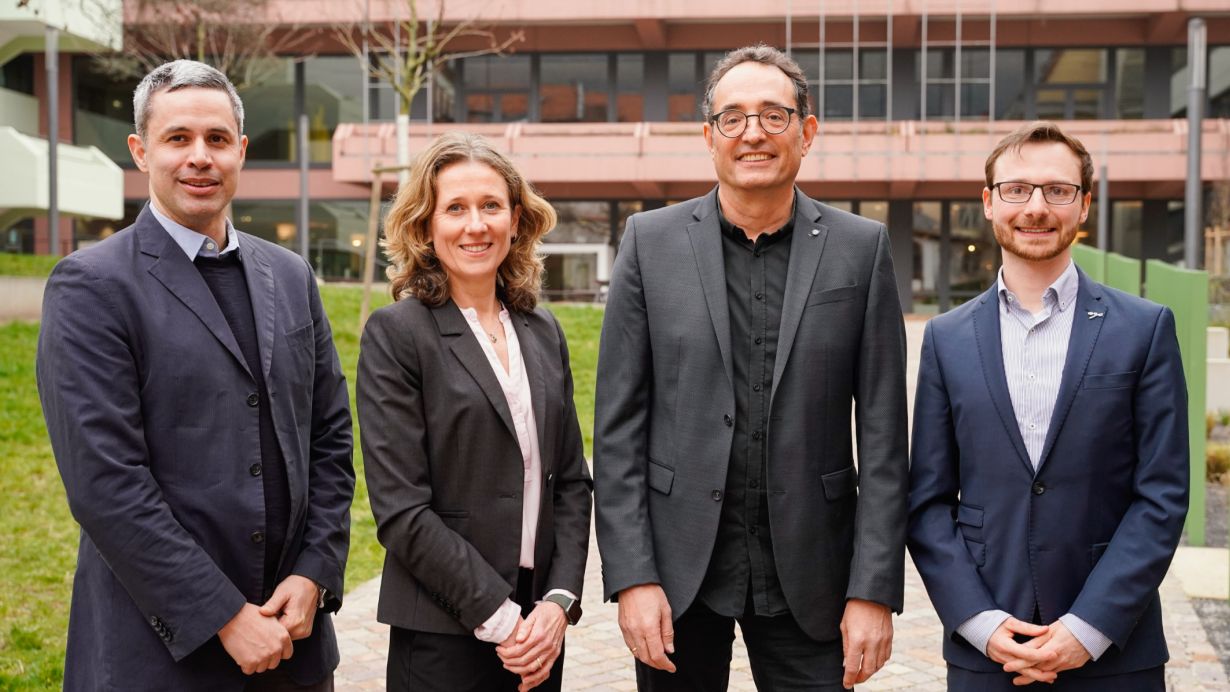
Applying and developing new technologies for DNA synthesis to pave the way for producing entire artificial genomes - that is the goal of a new interdisciplinary center that is being established at Heidelberg University, Karlsruhe Institute of Technology (KIT), and Johannes Gutenberg University Mainz (JGU). The aim of the Center for Synthetic Genomics is to spark new developments in synthetic genomics through basic research and technology development using methods of artificial intelligence. The Carl Zeiss Foundation (CZS) is financing the center's establishment over a period of six years with a total amount of twelve million euros.
In the long term, it should be possible to design and synthesize long DNA sequences for applications in research, nanomaterials science, and medicine. The first spokesperson of the new center is systems biologist Professor Michael Knop, Deputy Director of the Center for Molecular Biology of Heidelberg University (ZMBH).
While the past two decades of genome research were marked by the development of new genome sequencing techniques, it will become possible to modify genomes more quickly and easily, or even to create entirely new genomes, using innovative methods of DNA synthesis and genome assembly. This is the vision that the Carl Zeiss Foundation Center for Synthetic Genomics Heidelberg - Karlsruhe - Mainz (CZS Center SynGen) will pursue in the coming years. The researchers from the three universities want to design synthetic DNA sequences with the aid of AI-based methods of analysis and modeling in order to make targeted modifications in the genome of organisms and give it new functionalities. The aim is to extract from them so-called biologics, that is, biotechnologically manufactured products. These are eventually to be used to produce bio-based medicines, develop gene therapies for diseases, breed pest-resistant plants, produce biofuels, and advance research into new types of materials.
"At the CZS Centers we consolidate expertise across locations and disciplines. The life sciences in particular require a high degree of interdisciplinary collaboration. At the CZS Center SynGen we aim to advance the production of artificial DNA and tap the immense potential for research, medicine, and beyond," says Carl Zeiss Foundation Managing Director Dr. Felix Streiter, explaining the motivation for funding the second CZS Center in Germany.
"The Center for Synthetic Genomics pools the expertise of three of the leading research institutions, which are now jointly working on an important future-oriented field from basic research to technology development," says Professor Oliver Kraft, Acting President of KIT. "Our aim is to achieve a wide range of applications in biotechnology, for example in medicine, but also in materials science. We are very pleased to contribute to this with our expertise."
Synthetic Genomics
"Synthetic genomics is a young but rapidly growing research area worldwide, with transfer potential for different socially relevant challenges. In our new center we will pool the complementary expertise of the three strong research universities at Heidelberg, Karlsruhe, and Mainz in the life sciences, molecular systems engineering, and biomedical research. That way, we intend to coordinate all the steps in synthetic genomics, from design and production right up to the application of synthetic genetic materials and organisms," says Center Spokesperson Michael Knop. "The new center will provide us with a unique opportunity to combine different areas of expertise and disciplines in a new way. Particularly the discourse of biology and medicine with experts in simulation and modeling will show us new ways not only to generate synthetic genomes, but also to better understand and use natural and artificial modifications and epigenetic mechanisms," Professor Sylvia Erhardt explains. The molecular biologist of Karlsruhe Institute of Technology is a member of the CZS Center SynGen's three-member Board of Directors alongside Professor Michael Knop and biophysical chemist Professor Edward Lemke of Mainz University.
The Carl Zeiss Foundation Center for Synthetic Genomics Heidelberg - Karlsruhe - Mainz started work in January 2024. Researchers collaborating at the three locations represent different disciplines, including biology, biochemistry, biophysics, biotechnology, synthetic biology, and bioengineering, as well as philosophy and law, genomics, immunology, epigenetics, virology, and data science. In addition, more international experts and early-career researchers are to be recruited to work at the new center. Furthermore, a competence center for the synthesis of synthetic DNA is to be set up in Heidelberg, the so-called CZS Center Synthetic DNA Accelerator Lab. Also involved in the CZS Center SynGen are scientists from the German Cancer Research Center and the Heidelberg Institute for Theoretical Studies, as well as external partners from science and business.
The CZS Center SynGen was officially opened with a festive event held at Heidelberg University on March 4, 2024. In addition to the lead researchers, representatives of the Carl Zeiss Foundation and the participating universities also took part.
About the Carl Zeiss Foundation
The Carl Zeiss Foundation's mission is to create an open environment for scientific breakthroughs. As a partner of excellence in science, it supports basic research as well as applied sciences in the STEM subject areas (science, technology, engineering, and mathematics). Founded in 1889 by physicist and mathematician Ernst Abbe, the Carl Zeiss Foundation is one of the oldest and largest private science funding institutions in Germany.
Further information:
Website of the CZS Center SynGen: https://syn-gen.de
Being "The Research University in the Helmholtz Association", KIT creates and imparts knowledge for the society and the environment. It is the objective to make significant contributions to the global challenges in the fields of energy, mobility, and information. For this, about 9,800 employees cooperate in a broad range of disciplines in natural sciences, engineering sciences, economics, and the humanities and social sciences. KIT prepares its 22,300 students for responsible tasks in society, industry, and science by offering research-based study programs. Innovation efforts at KIT build a bridge between important scientific findings and their application for the benefit of society, economic prosperity, and the preservation of our natural basis of life. KIT is one of the German universities of excellence.






